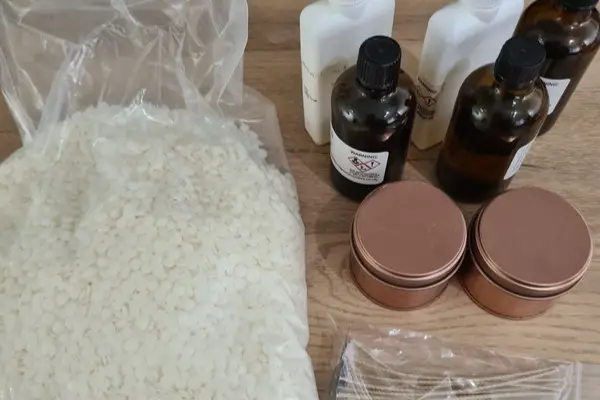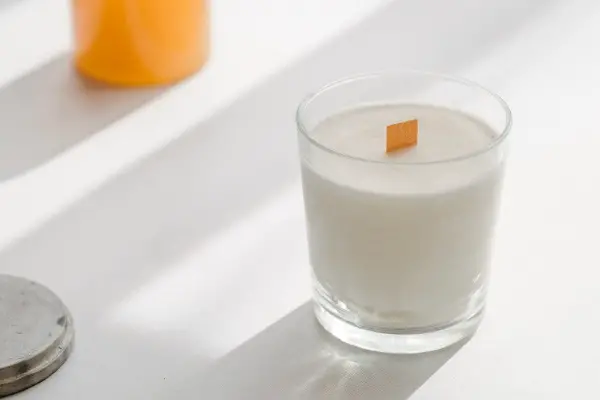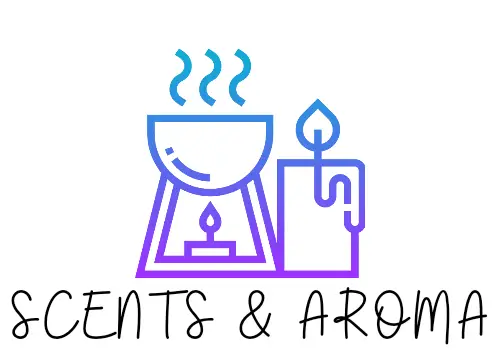The days when candles used to be the primary source of light and illumination are far behind us. Regardless, candles are still relevant. Besides uses for lighting, candles have gained popularity for adding ambience and scents to a living space.
Deciding on which of the two candles is best depends on your preference and a few other factors. For example, essential oil candles have a longer shelf life and offer more health benefits.
However, fragrance oil candles are cheaper, more sustainable, retain more heat, are available in varieties, and throw off a better scent.

However, you must consider other factors like allergies, skin types, user preference, and a host of other factors we will discuss below.
Although choosing any scent is not a difficult task, finding the appropriate ingredient can be difficult. Fragrance oils and essential oils are two of the most popular candle scents. However, there is a standing debate on which oil is better for candles.
Before we begin this guide I just want to point out how important it is to make sure that whether you are using fragrance oil or essential oil in your candles that it so important to get the correct ratios. That is why I recommend that you use my free fragrance oil, essential oil and wax calculator for working out your correct weights.
Fragrance oils vs Essential oils.
This article is going to go really in depth about all the positives and negatives of both essential and fragrance oils.
I really recommend reading it all if you are planning to start a candle makings company or even if you are just planning to buy some candles. There will be bucket loads of vital and interesting information.
However if you are a little short on time I will give you the quick and general answer first.
So which is the better fragrance oil or essential oil for candles? Both fragrance oils and essential oils have their own lists of positives and negatives. You must first consider factors such as cost, scent throw, sustainability and even allergies before deciding which one is best for you and your business. There is no one size fits all when it come to fragrance oils and essential oils.
What is fragrance oil?
Fragrance oil is a synthetic oil developed in a laboratory for its scent. As a result, the oil is engineered to last longer than essential oil and remain non-volatile.
Since fragrance oil is manufactured, its safety is regulated by the International Fragrance Association and the Research Institute for Fragrance Materials.
To determine if the ingredient used is safe for use, the bodies test each ingredient, collect data, and publish their findings in the form of usage guidelines and recommendations.
There are two types or categories of fragrance oil. They are:
- Natural fragrance oils: natural Fragrance oils are also made in the lab. However, natural aromatic components are isolated from a more complex scent. Hence, although derived from nature, they are formulated with science.
- Synthetic fragrance oils: synthetic fragrance oils are a product of chemical components that you won’t find in nature. In essence, they are artificially created.
Natural and synthetic fragrance oils are both products of a chemical process but with different bases. However, for a natural fragrance, the recreated scents already exist. On the other hand, synthetic oil is 100% chemical engineered.
What is an essential oil?
In simple words, essential oils are plant extracts from leaves, flowers, bark, and roots. Apart from being natural oil, essential oil contains the essence of a plant.
For example, when you walk through a flower garden or peel an orange, you will usually get attracted to the scent of the plant. The essential oils in these plants are what we smell.
The oil comes from different plant parts. The oil is extracted through solve extraction or steam distillation.
However, obtaining oil from some plants can be a bit difficult. Regardless, essential oils are natural, unprocessed, undiluted, and without any form of additive or solvent.
Thanks to nature’s astounding abilities, essential oils contain up to 500 naturally occurring chemicals found in plants. Some of these chemicals have not been identified.
As a result, it is hard to synthetically produce essential oils. The climatic and growing condition also makes it a tough job.
Is fragrance oil toxic?
Fragrance oils without paraben and phthalate are generally safe to use. Fragrance oil is also approved by the concerned regulatory agencies as safe for use.
Individuals and companies that manufacture fragrance oil have a responsibility to label their products and ensure they are safe for use.
In light of this, the oil constituents are regulated by the Research Institute for Fragrance Materials and the International Fragrance Association. This is to ensure that fragrance materials are safe for use.
Although fragrance oils are generally safe, they sometimes contain additives like phthalates, synthetic musks, and parabens that may not be healthy.
The synthetic fragrance also sometimes contains allergens that may react differently with the nervous and immune systems. On the other hand, natural fragrance oils are safe to inhale when they are diluted.
The compounds in a fragrance oil are usually tested for tolerance. However, you can’t always tell how much of it you will get in a day or how your body will react to it. Nonetheless, fragrance oils without paraben and phthalate are generally safe to use.
Are essential oils toxic?

Just because essential oils are derived from nature does not mean they are absolutely harmless. Like we explained, essential oils are completely natural.
As a result, it may contain a high concentration of plant substances that can trigger a reaction in individuals when consumed.
Apart from this, essential oils that are not toxic to some people may have a different effect on another group of people because of age, medical condition, etc.
Like the way a friend will react to a particular flower and you won’t, works the same way.
We always recommend that you read the descriptions of the ingredients in essential oil to know if you are allergic or not. However, the lack of oxidation makes essential oils generally safe for use.
Besides uses for humans, concentrated essential oils can also be harmful to pets and children. Hence, you need proper care, education, and responsible handling to ensure their safe and effective use.
For example peppermint essential oil is highly toxic to dogs as I wrote about in this guide.
Does fragrance oil smell more than essential oil?
Yes, fragrance oil smells more than essential oil. The bet is on fragrance oil if you want an intense scent for all your money can buy.
For example, if you put a drop of fragrance oil and essential oil in different candles, the candle with the essential oil will have a less intense scent.
The reason why fragrance oil smells more than essential oil is because fragrance oil is formulated to deliver a strong impact.
Hence, it is formulated to deliver scent in a high concentration. Apart from this, fragrance oils hold scents for a longer period.
Which is better for making candles?
Scent Throw
Fragrance oil throws scents better than essential oil. Since fragrance oil is packed with fragrance, they have a stronger scent throw compared to essential oil.
However, you can use your preference to decide which one you want. For example, if you want a less noticeable aroma, essential oil candles are a better alternative. However, if you want a fragrance that lingers on in the air, you should choose fragrance oil candles.
Price and Cost
Fragrance oil is cheaper than essential oil. So, for this, fragrance oil is our winner. To fill a 5ml jar of rose essential oil, you need more than 9 kilograms of rose petals. As a result, it puts essential oil candles out of the reach of many.
Depending on the type of oil, essential oils are usually pricey.
When you factor in the process of planting, growing, harvesting, and distilling the plant for its oil, you will understand why it costs so much.
On the other hand, fragrance oil candles are more economical and reasonably priced. In essence, you don’t need 1000 rose petals to make a single drop.
Fragrance oil is easy to make and doesn’t require any of the expensive extraction processes essential oils are known for.
Variety
There is no number or limit to the number of scents you can have in fragrance oil. Since the chemical formula is usually the same, manufacturers have no problem maintaining a high smell constituency.
However, varieties of essential oil candles are usually in short supply. Do note, though, that there are many types of essential oils that you can choose from or blend. However, on the scale of one to infinity, the natural oil options will run out first before scientists run out of permutation for the fragrance oil.
Heat Retention
Fragrance oil reacts better to heat than essential oils. True, essential oil candles have a cold throw. However, not all essential oil can withstand the heat of a burning candle.
Sustainability and Eco-friendliness
Environmental activists prefer fragrance oil to essential oil. This is because too many plants go into producing drops of essential oil.
Apart from this, the plants are usually grown in a different part of the world and extracted and distilled in a different part.
Also, harvesting trees like the sandalwood trees grown primarily in India could lead to deforestation, overharvesting, and endangerment of some species. The cost of essential oil is also something most people cannot afford.
Health Benefits
Essential oils have more health benefits than fragrance oil. Thanks to its natural components and ingredients, essential oils relieve skin problems and muscle pains.
As a result, essential oils are used in aromatherapy. On the other hand, most fragrance oils are purely designed for scent. Hence, they don’t offer the many health benefits that plants offer.
However, don’t forget that natural plants can still trigger allergies in people despite their many health benefits.
Shelf life
Fragrance oil candles, by industry standards, retain their scent for up to a year if left open to the air. However, essential oil candles have an even longer shelf life.
The shelf life of essential oil can range between 2-5 years and may even be up to 15 years, depending on the organic matter. However, essential oils evaporate faster than fragrance oils. As a result, it must always be covered to seal the scent.
Final thoughts
Scented candles, regardless of the type, add ambience to your home. Since there is no rule of thumb, you can get creative and choose what makes you feel good. However do not forget to factor in all of the above information.
If you enjoyed reading this article why not check out more of my candle guides.
- Can You Put Perfume In A Humidifier? (Read First) - September 17, 2022
- Can You Put Essential Oil In A Steam Mop? (Safety Advice) - September 17, 2022
- How To Make Lavender Oil At Home ( Candles And Diffusers) - September 9, 2022
